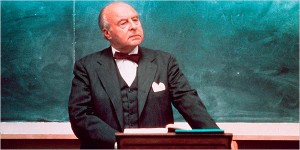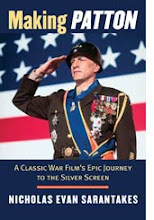Earlier this year, Fredrik Logevall of Harvard University and
Kenneth Osgood of the Colorado School of the Mines started a public debate about the status of political history. They published an editorial in The New York Times: "Why Did We Stop Teaching Political History?" Neither of these guys is a slouch, complaining about how the profession has passed them and their field by. Logevall won the Pulitzer Prize for his book on the French war in Vietnam, and Osgood's book on Eisenhower's propaganda campaigns won the Herbert Hoover Book Award, which is less well-known but still quite difficult to receive. They noted that at one time political history had real influence and pull with those that ran for office. That has changed in the years since. The two also argued:
Perceived “traditional” types of history that examined the doings of governing elites fell into disfavor, and political history suffered the effects (as did its cousins, diplomatic and military history). The ramifications extend well beyond higher education. The drying up of scholarly expertise affects universities’ ability to educate teachers—as well as aspiring lawyers, politicians, journalists and business leaders—who will enter their professions having learned too little about the nation’s political history. Not least, in this age of extreme partisanship, they’ll be insufficiently aware of the importance that compromise has played in America’s past, of the vital role of mutual give-and-take in the democratic process.
One measure of the decline in political history is the decline in the number of jobs advertised as political history.
Although Logevall and Osgood are historians, neither teaches in a history department. (I should clarify a bit; Logevall has a joint appointment with the Kennedy School; how much time he devotes to each probably varies from semester to semester). They did not publish in
The New York Times for its prestige. Their recommendations for reform make that clear:
Change will not be easy, and will not come from history departments facing tight budgets and competing demands. What is needed, to begin with, is for university administrators to identify political history as a priority, for students and families to lobby their schools, for benefactors to endow professorships and graduate fellowships and for lawmakers and school boards to enact policies that bolster its teaching—and without politicizing the enterprise.
Since many universities in the United States are public institutions—think of schools like the University of Michigan, the University of Virginia, or Florida State University—and receive their funding from states run by politicians and you might start to realize what a powerful call to action Logevall and Osgood are making.
Days later—actually two—Julian Zelizer of Princeton University fired back with an essay on the blog of the Organization of American Historians:
"Political History is Doing AOK." He argues: "Over the past twenty years the field has experienced nothing short of a renaissance." It is a very diverse field with many new approaches. He also adds: "While there was a period in the 1970s when we did move away from 'elections, elected officials, policy and policymaking, parties and party politics,' this is not the case today." He also disputes many of the arguments made by Logevall and Osgood: "In terms of the lack of jobs, that is a different story. The meager number of jobs in political history is not unique to the field. Everyone in the history profession currently faces a job market that isn’t there."
The OAH then sponsored a
forum staring four relatively junior political historians: "What is the State of American Political History" and asked them their thoughts about the Logevall and Osgood article. From my perspective, if they want to call themselves political historians, fine. But I am not sure a lot of others would describe them that way. Their description of what they wanted the field to study would also be difficult to characterize as political history. With those two points in mind, it is no surprise that they are skeptical about Logevall and Osgood's positions.
They were not the only ones. Mark Graber of the University of Maryland Law School responded on the Balinization blog with a post entitled:
"Rumors of Our Death Have Been Greatly Exaggerated." He argued, "There may be a lot to be said about what happens when political history is done by political scientists rather than historians (we call it "political development"), but calling the field dead is confusing what may be happening in one discipline with what is not happening in the academy at large."
There was also a lot of push back on Twitter. I am not sure how much deep thinking you can do on Twitter, but the legal historian Mary L. Dudziak does a good job of summarizing the various reactions in a post:
"Political History is Alive and Well, and Matters More than Ever" that also appeared on the Balkinization blog. In summary, she states "the op-ed’s argument fell flat." I am not sure that is true. I get that most digitally minded historians pushed back on it—even those that consider themselves political historians—but I think Logevall and Osgood were playing for the long haul.
Roy Rogers, a Ph.D. candidate in American History at the Graduate Center of the City University of New York and a writing fellow at the New York City College of Technology, and a contributor to The Junto group blog that focuses on early American history, wrote an essay that while negative towards Logevall and Osgood's arguments, did more to confirm them than deny them. In
"The Strange Death (?) of Political History," he stated that the two were addressing the field from their perspective as historians working on Twentieth Century topics. "Perhaps political history is dead, but it died a strange death. It is certainly true that, from a certain point of view, political history has declined over the last several decades. But that perspective is partially a matter of definitions. Logevall and Osgood have a very constrained definition of what constitutes political history." Developments in the historical profession "forced a fundamental change in what it means to be political. The search for politics moved out of the state house and into the streets, the fields, the parlor, and even the bedroom." My take: that is something, but it ain't political history.
Gabriel Rosenberg of Duke University and Ariel Ron of Southern Methodist University wrote a post for the blog Lawyers, Guns & Money with a title that makes their thesis pretty clear:
"Chill Out. Political History has Never Been Better." Their essay is similar to Rogers' in that it basically does more to confirm rather than deny Logevall and Osgood arguments even though its purpose was the exact opposite. They make the same basic argument as well: Logevall and Osgood have to narrow a definition. They offer up a number of titles that they claim are political history—but really aren't—to refute Logevall and Osgood. Rosenberg and Ron also make the mistake of conflating policy history with political history, citing the relatively healthy Society for Historians of American Foreign Relations which has well-attended conferences and a thick journal. SHAFR is the main organization in diplomatic history, and their arguments are basically correct about the organization. But I would argue that diplomatic history is very different from political history. (Logevall and Osgood make this point explicitly in their essay).
Logevall and Osgood were hardly dissuaded by these type of arguments. They
appeared on the podcast of
The American Interest roughly a month after their essay appeared in the
Times.
Logevall did clarify that they did not pick the title, and that it was a bit misleading, but other than that they held firm. They discussed how many historians were uncomfortable discussing "high politics," When asked about Zelizer's arguments about diversity, Logevall explained, "I don't think he is wrong, but what I said to him is that something has been lost."
So, what are we to make of all this bleeding of digital ink? I am not sure anyone is totally right in this debate. First, I do not think historians are every going to be turned to as policy makers or advisors just because they are historians. Some will find positions of influence in government, but that will be because of their personal efforts and connections.
Next, I actually think political history has been strong, even if not popular. There is a clear public audience for this type of historical literature. But even within the profession historians have done well producing this type of history. Stephen Ambrose, Robert Dallek, and H. W. Brands come to mind immediately, but there are others: Alonzo Hamby, William Leuchtenberg, and Sean Wilentz. As the history book review editor for the academic journal
Presidential Studies Quarterly, I am swamped with titles. Even those on the presidents we do not care that much about like Millard Fillmore or Chester A. Arthur. Writing on presidents consistently seems a great way to get a lot of attention within the profession.
But there is the rub and that gets to my third point: political history seems to be focused on the executive branch. The legislative and judicial branches get far less attention, so there is some real merit to what Logevall and Osgood argue. This executive branch bias also appears to be the case when historians look at state level politics. There are a number of reasons for this emphasis. There are fewer presidents and governors and it is easier to focus on them. Presidents of the United States—at least those in the Twentieth Century—have presidential libraries, which makes research easy compared to trying to track down the personal papers of the 10 or 15 Senators that sat on the Armed Services Committee. They might be at institutions on opposite sides of the country, making travel and research expensive. (The best case scenario is that they are at the Library of Congress, which happens a lot, but not enough). Then there is the question of quality of organization. I have looked at the papers of some senators that were still sitting in the boxes in which they were mailed to the archives three decades before. Then again I have found others that were organized beautifully. There is also the question of how important is any one senator. There are a hundred of them; more than 1,100 since 1789. All of them "matter," but some of them a lot more than others—the Henry Clays, John C. Calhouns, Daniel Websters, Henry Cabot Lodges and Lyndon Johnsons of the world are better known than those they served with in the Senate, or those that held their seats in the years since for a reason.
Moving on to point four: policy history is a new development, but even if it incorporates new subjects and perspectives, it is not political history and it still tends to be executive branch centric. How much influence did the Senate Foreign Relations Committee have in the development of U.S. foreign policy during the Cold War? "Don't know" is the short answer, because no one has written on the committee as a institution. There are biographies of individual senators, but that is a bit of a narrow focus, much like trying to watch a film by looking through a straw. How influential are the Speakers of the House? How much influence do they have on legislation, policy, and the political direction of Washington? Are they the equal of presidents, or in a relatively junior position? Political scientists have spent a lot of time answering these questions, but their answers have to be tentative given the imbalance in coverage. Case in point, how many books are there on Sam Rayburn? (Some of you are probably wondering who is Sam Rayburn? Answer: he set the record for longest tenure as Speaker of the House of Representatives.) There are four books on Rayburn. Now, think of how many biographies—and just biographies—are out there for Franklin D. Roosevelt, Harry S. Truman, Dwight D. Eisenhower, and John F. Kennedy—the presidents he interacted with as Speaker.
Here comes point number five: there is still a lot of good work to be done. Elections—which are purely political—are topics that have seen less attention than the deserve. What do they tell us about the American people? Actually a lot if we pay attention. Polling data is quite informative, but there is still a lot of information that we can utilize from elections before this practice became widespread and dependable. Again, political scientists do a lot on this topic, but the focus seems to be on the second half of the Twentieth Century, and on the presidential elections.
This is the last point: Logevall and Osgood might not be getting much agreement from their peers, but that is not the audience they were really addressing. I would not be surprised if this article has some long-term reverberations in the historiography of American history, but also on other higher education related activities like appropriations and fund raising.























